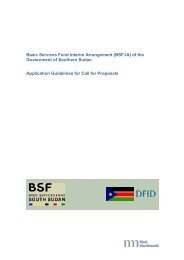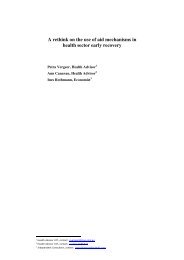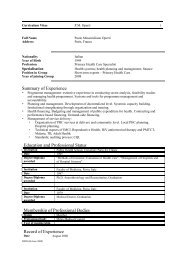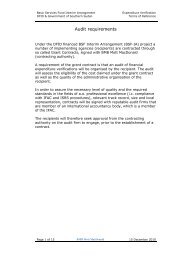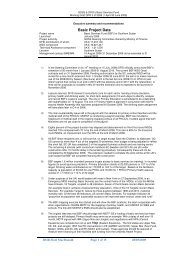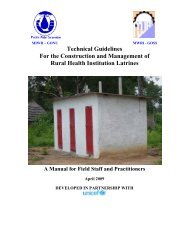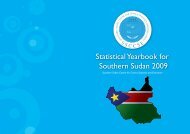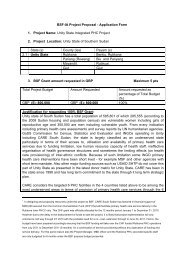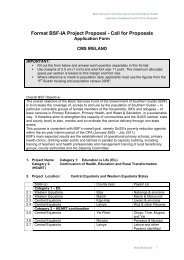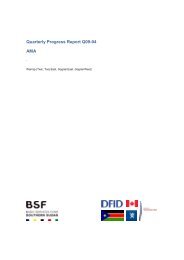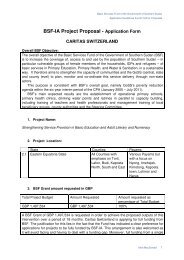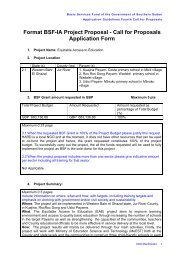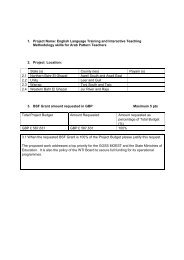IRD BSF-IA Proposal - Basic Services Fund SOUTH SUDAN
IRD BSF-IA Proposal - Basic Services Fund SOUTH SUDAN
IRD BSF-IA Proposal - Basic Services Fund SOUTH SUDAN
You also want an ePaper? Increase the reach of your titles
YUMPU automatically turns print PDFs into web optimized ePapers that Google loves.
7. Description of activities per result and sector: Maximum 5 pts<br />
Maximum 3 pages<br />
7.1 Include detailed description of each project output and the corresponding activities<br />
Under the proposed project <strong>IRD</strong> will focus on the health and water and sanitation sectors.<br />
Results in primary health care will include structural, equipment and material outputs. <strong>IRD</strong> will<br />
emphasize bringing health facilities up to the BPHS standard with close involvement of the<br />
CHD. <strong>IRD</strong> will work with JDF to bring the DLBC in Duk Payuel up to the BEmONCPHCC level<br />
through rehabilitation, construction, staffing and equipment needs. As the DLBC has<br />
undergone several improvements under CHESS, <strong>IRD</strong> will only need to provide an inpatient/observation<br />
area with 10 beds, separate maternity ward, minor surgical theatre area,<br />
climate controlled pharmacy area, improved 24 hr electrical supply and expanded staff<br />
housing. <strong>IRD</strong> will provide water harvesting and storage for the 3 PHCUs constructed under<br />
CHESS and construct one PHCU in Pagaak including an institutional latrine block.<br />
Equipment for the 4 PHCUs will be provided by the project and in collaboration with UNICEF.<br />
As part of this, <strong>IRD</strong> will work with JDF to expand and improve the cold chain to increase<br />
vaccination and Vitamin A coverage to 40 percent. The JDF has procured the necessary<br />
equipment including solar panels, medicine and lab test refrigeration equipment at the DLBC.<br />
The project will assist in maintaining the cold chain though training of staff and local<br />
authorities, while collaborating with UNICEF and GoSS for a sustained supply of medicines.<br />
The strengthened relationship between the local CHD, State and Juba level MoH, and<br />
UNICEF will work to avoid stock outages and generally increase the availability of MMR,<br />
BCG, DPT, Tetanus, OPV (polio) and other vaccines. To improve transportation, the project<br />
will also provide JDF with more cold boxes and motor bikes. Essential pharmaceuticals and<br />
IEC materials will be provided for the CHD, DLBC and 4 PHCUs. JDF will receive monthly<br />
funding to cover the cost of additional required pharmaceuticals not provided by the MoH.<br />
Results in primary health care training will include outputs involving the healthcare staff at the<br />
DLBC, CHWs, VCWs, AES instructors, the CHD and local authorities, as well as local<br />
communities. Training for health care service providers will include refresher/on-the-job<br />
training for the 9 staff at the DLBC covering topic areas for a BEmONCPHCC level facility.<br />
The project will support the DLBC with provision of salaries for all staff. As part of the EPI<br />
services mentioned above, <strong>IRD</strong> will support the DLBC in expanding the three person<br />
inoculators’ team and emphasize the use of child health cards. <strong>IRD</strong> will support the CHD in<br />
providing MoH CHW certification training for 40 percent (approx 27) of untrained CHWs and<br />
TBAs. The training will take place in Duk and participants will be provided with a stipend,<br />
living arrangements and food. Through an arrangement with the MoH in Bor instructors will be<br />
seconded for the 9-month training in Duk. The CHWs trained under the project will return to<br />
their PHCU post and receive top up of salary if not receiving this through the MoH. Selection<br />
criteria for training will be based on a community assessment, and take into account the<br />
amount of training to date, the recommendation of community members, and the motivation to<br />
work. <strong>IRD</strong> will also emphasize training of BHCs and continue to work with the four BHCs<br />
formed under CHESS in Payuel, Mareng, Pajut and Pakam. <strong>IRD</strong> will re-establish and train an<br />
additional 13 BHCs linked to other county PHCUs. Member selection will be conducted in<br />
coordination with the CHD, local authorities and community leaders and seek to be a<br />
representative of the community and maintain a gender balance. Initial trainings will focus on<br />
basic health topics (per MoH curriculum) and relationship to project and PHCU activities.<br />
Members will be motivated to have ownership and involvement in community health activities.<br />
Their key functions will include health promotion, community mobilization for health education<br />
campaign activities, and active case finding and referral, as well as morbidity and mortality<br />
surveillance.<br />
BHCs will also be closely linked to the health and education campaigns conducted in each<br />
payam. <strong>IRD</strong> and the CHD will work to improve awareness of common health issues and<br />
increase demand for services through 16 health and hygiene campaigns (2 per payam<br />
conducted) and the training of 16 Adult Education System (AES) instructors on health and<br />
International Relief and Development US <strong>Basic</strong> <strong>Services</strong> <strong>Fund</strong> and Mott MacDonald 5



